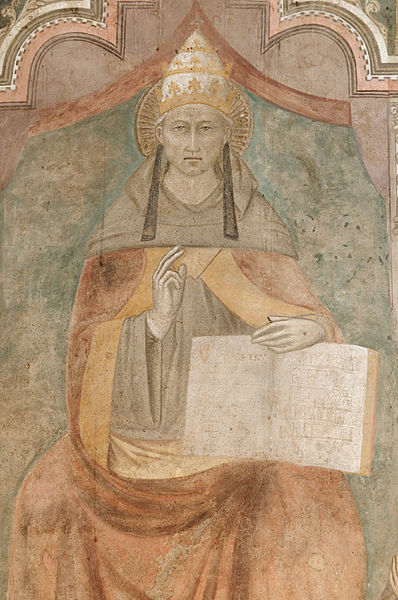Everyone is still shocked by the announcement made by the Pope today that he will resign, effective February 28, just 17 days from now. There are many commentators opining on the why’s and wherefores, but perhaps the most interesting strain in the commentary has to do with the last pope who resigned, St. Celestine V. Scott Hahn made an interesting post in which he mentions Pope Benedict’s two trips to pray by the tomb and relics (respectively) of Celestine V–notably the Pope left his pallium on Celestine’s tomb on April 29, 2009. (Interestingly, as Rocco Palmo notes, this pallium was the one with which Benedict was originally vested. The pope “retired” it from use and went to a smaller size of pallium. More here: Fr. Z, NLM)
St. Celestine resigned the papacy in 1294 after reigning for a mere six months. (Technically, the last Pope to resign was Gregory XII in 1415, but his situation was complicated by the Avignon papacy dispute.) St. Celestine was a Benedictine monk and hermit, who actually founded an order. He was famous for his ascetical practices. He was not a cardinal at the time of his election, but did send a letter to the conclave, which upon reading it, promptly elected him, even though he was 80 years old. It reminds me of Cardinal Ratzinger’s homily at the funeral of John Paul II in which he spoke against the dictatorship of relativism and described what the new Pope should be like. Apparently, anyone who tries to tell the cardinals how to go about the business of the Conclave becomes an immediate candidate!
Now, on to Dante! In his Inferno, Canto III, lines 58-63 (in Dorothy Sayers’ translation) we read:
And when I’d noted here and there a shade
Whose face I knew, I saw and recognized
The coward spirit of the man who madeThe great refusal; and that proof sufficed;
Here was that rabble, here without a doubt,
Whom God and whom His enemies despised.
Now, Celestine is found in Hell’s “vestibule” here with the futile, who run around after meaningless banners, goaded by hornets. They are at the very “top” so to speak, of Dante’s Hell. Dante’s condemnation of Celestine V was rooted in the problematic reign of his successor, Boniface VIII, who imprisoned his predecessor. Apparently, Dante felt that Celestine should have embraced the office and out of cowardice or a faint heart, he abdicated, which led to very bad things in the reign of the next pope. Celestine died in a fetid jail cell. Interestingly, later on, Pope Clement V undid Dante’s literary condemnation and officially canonized Celestine V.
Later on, in the Inferno, Canto XXVII, lines 103-105, the character Guido is recounting Pope Boniface VIII’s words thusly:
Thou knowest I have the power to open or shut
The gates of Heaven, for those High Keys are twain,
The Keys my predecessor cherished not.
Again here, Dante is condemning Pope Celestine V for his resignation of the papacy.
So, why would Benedict XVI identify with Celestine V?
- Both Celestine and Benedict practice Benedictine spirituality–Celestine as a hermit/monk and Benedict as an oblate (although I have had a hard time confirming that Ratzinger/Benedict is an oblate). Also, Benedict took on the name of St. Benedict and Benedict XV.
- Both hoped to retire from public life–Celestine as a hermit, Benedict to a quiet retirement with his brother in Germany.
- Both were elected very late in life–Celestine at 80 and Benedict at 78.
- Both saw themselves perhaps as short-term popes–Celestine for 6 months, Benedict now for 8 years.
- Both resigned–Celestine in 1294, Benedict in 2013.
I am glad, though, that Benedict XVI is able to trust in the Church’s wisdom in canonizing Celestine V rather than in the literary “wisdom” of Dante. In many things, Catholic thinkers and writers have deferred to Dante, but his judgment of Celestine V proved incorrect and may be shaped more by the travails of his era than by the actual facts of Celestine’s life. At this moment, it is best for all of us to pray for the conclave and the Holy Father’s sucessor. May the Holy Spirit guide the cardinals’ votes. St. Celestine V, pray for us!
Links on this topic:
Robert Moynihan, article
Robert Moynihan, lecture
Taylor Marshall
Mosaics

